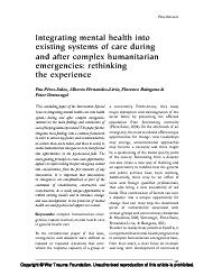Integrating mental health into existing systems of care during and after complex humanitarian emergencies: rethinking the experience
This concluding paper of the Intervention Special Issue on integrating mental health care into health systems during and after complex emergencies summarises the main findings and conclusions of each of the programmes presented. This paper further integrates these findings into a common framework in order to extract key factors and recommendations on actions that can be taken, and those to avoid, to enable humanitarian emergencies to be transformed into opportunities in the psychosocial field. The main guiding principle to create such opportunities appears to require taking the post emergency context into consideration, from the first moments of any intervention. It is important that interventions in emergencies are conceptualised as part of the continuum of rehabilitation, construction and reconstruction. As a result, unique opportunities to rethink existing models and to introduce changes and new developments in the provision of mental health care and psychosocial support are created.
Geachte bezoeker,
De informatie die u nu opvraagt, kan door psychotraumanet niet aan u worden getoond. Dit kan verschillende redenen hebben,
waarvan (bescherming van het) auteursrecht de meeste voorkomende is. Wanneer het mogelijk is om u door te verwijzen naar de bron
van deze informatie, dan ziet u hier onder een link naar die plek.
Als er geen link staat, kunt u contact opnemen met de bibliotheek,
die u verder op weg kan helpen.
Met vriendelijke groet,
Het psychotraumanet-team.
Reference:
Pau Pérez-Sales, Alberto Férnandez-Liria, Florence Baingana, Peter Ventevogel
| 2011
In: Intervention: the international journal of mental health, psychosocial work and counselling in areas of armed conflict, ISSN 1571-8883 | 9 | 3 | 345-357
http://www.interventionjournal.com/sites/default/files/Perez_2011_Int_Integrating_MH_into_existing_systems_of.15%20%281%29.pdf
In: Intervention: the international journal of mental health, psychosocial work and counselling in areas of armed conflict, ISSN 1571-8883 | 9 | 3 | 345-357
http://www.interventionjournal.com/sites/default/files/Perez_2011_Int_Integrating_MH_into_existing_systems_of.15%20%281%29.pdf


